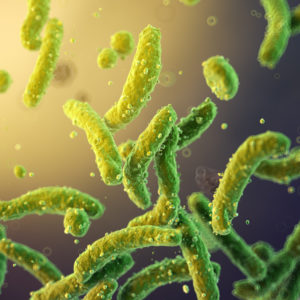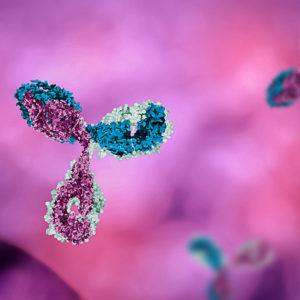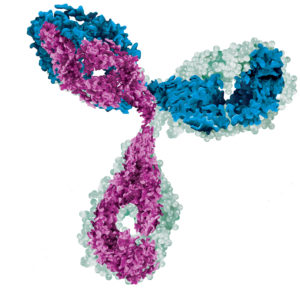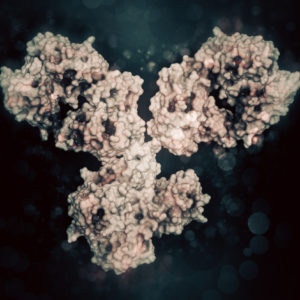Clostridium
The Native Antigen Company offers a wide range of native Clostridium difficile toxins, toxoids and related antibodies, including the C. tetani toxin, for IVD assay development and vaccine R&D.
Clostridium Background
Clostridium difficile is a gram-positive, spore-forming, anaerobic bacterium, first described in the mid-1930s and later linked to cases of pseudomembranous colitis. Studies have since shown that C. difficile is predominantly associated with cases of infectious diarrhoea in patients that have been treated with antibiotics (antibiotic-associated diarrhoea, or AAD), or whose commensal gastrointestinal flora has been disrupted. C. difficile infection can cause severe disease and death in a significant number of cases and is recognised as a leading cause of severe gastrointestinal disease and AAD in hospitalised patients (Voth, DE). The severity of the disease in each case is determined by the virulence of the C. difficile strain, the condition of the patient’s flora and the individual’s immune response to intestinal damage. C. difficile spores are found in soil, human and animal faeces, and some processed meats, and can be transmitted from one individual to another through contact with contaminated surfaces. Toxins A and B have been identified as major C. difficilevirulence factors, which are encoded by the tcdA and tcdB genes, respectively. Both toxin A and toxin B have proinflammatory and cytotoxic activity, which causes disruption to the intestinal epithelium leading to extensive damage and cell death in the large intestine (Carter, GP).
In recent years the emergence of a hypervirulent strain of C. difficile, BI/NAP1/027 has caused an epidemic in the developed world and has raised significant concern within the global health care community. In addition to increased rates of mortality, BI/BAP1/07 has been reported in individuals previously considered to be low-risk, including outbreaks in peripartum women and health-care workers (Ghose, C). Treatment for cases of C. difficile uses antibiotic-based therapy but can be problematic due to antibiotic resistance. There is no effective licensed vaccine for the prophylactic treatment of C. difficile but significant advances are being made in this area.
Clostridium tetani is an anaerobic, gram-positive, spore-forming bacillus that produces a potent exotoxin that is extremely toxic to humans and animals, causing a disease known as Tetanus (Lockjaw). Its spores are extremely hardy and are ubiquitous worldwide where they can be found in soil and in the intestinal tracts of humans and other animals. C. tetani enters the host through open wounds and produces a toxin that causes prolonged spasms and tetani. The bacteria is not communicable between human hosts. Tetanus toxin (or tetanospasmin) is a 150-kDa protein closely related to botulinum toxin, produced by Clostridium botulinum. Unlike botulinum toxin, which remains at the neuromuscular junction to cause a flaccid paralysis, tetanus toxin is transported within the motor nerves to the central nervous system (CNS). Once there, the toxin acts by blocking the release of the inhibitory neurotransmitters glycine and gamma-aminobutyric acid at motor nerve endings. This blockade leads to the widespread activation of motor neurons and spasming of muscles throughout the body (Berkowitz, 2018).
An effective tetanus toxoid vaccine (TT) was developed in 1926 comprising a solution of formaldehyde-deactivated toxin isolated from the bacterium. Vaccination is often carried out in combination with diphtheria, tetanus, and pertussis vaccines and is given in infancy followed by 10-year boosters.
Clostridium Antigens
Our highly purified Clostridium difficile toxin preparations come in a variety of ribotypes and are suitable for numerous assays including cytotoxicity. Assays are available in a range of pack sizes and all come lyophilised for ease of storage and use. Our toxoids are prepared from formaldehyde treatment of toxins and are suitable for use as immunogens and in clinical diagnostics assays.
We also offer a recombinant Tetanus toxoid, heavy chain fragment C that is devoid of the toxin’s enzymatic activity but contains the binding site necessary for uptake of the toxin by neurons.

Clostridium difficile ribotype R027 toxin A
$442.23 – $2,966.65 excl. VAT
Clostridium difficile ribotype R027 toxin B
$1,328.64 – $9,318.41 excl. VAT
Clostridium difficile ribotype R087 toxin A
$442.23 – $2,966.65 excl. VAT
Clostridium difficile ribotype R087 toxin B
$1,328.64 – $9,318.41 excl. VAT
Clostridium Difficile Toxoid A
$442.23 – $2,966.65 excl. VAT
Clostridium Difficile Toxoid B
$1,328.64 – $8,705.64 excl. VAT
Clostridium Antibodies
Our Clostridium-specific antibodies recognise toxins and enzymes from the Clostridium genus of gram-positive bacteria. Clostridium antibodies supplied by The Native Antigen Company are suitable for use in immunoassay research and development.
These include antibodies specific for C. difficile toxins A and B, C. difficile GDH antigen (enzyme), and antibodies specific to C. tetani toxin.
Questions?
Check out our FAQ section for answers to the most frequently asked questions about our website and company.



